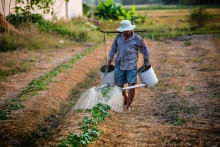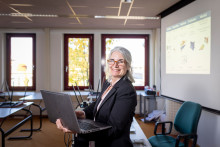ITC Faculty of the University of Twente is one of the partners in the SMARTseeds project, which should within three years deliver a mobile service that supports mainly small-scale chili, tomato and cucumber farmers in several provinces of Indonesia.
Satellite images
If everything goes as planned, the farmers will then receive information via text messages and a mobile phone app. They will have access to daily and seasonal weather forecast, as well as agricultural advice, such as when and how much of fertilizer or pesticides should be applied to their fields.
‘ITC’s task is to ensure automated processing of satellite images,’ explains Wietske Bijker, who is responsible for the project on behalf of ITC. ‘In the end, we want to train the computer to automatically recognize crops – where they grow and how well they are doing. That is a lot of work, because we need to combine a lot of different data from the new Sentinel satellites.’
Growing vegetable market
Another challenge lies in the project’s focus: vegetable produce. ‘We still need to establish how detailed information on vegetable produce we can and want to extract from satellite images, because previous research focused on other crops like rice or wheat,’ says Bijker. ‘The focus on chili, tomato and cucumber farmers is important, though, because vegetable market is growing in Indonesia. At the same time, many areas are affected by climate change, which means that traditional farming doesn’t result in good produce anymore.’
The SMARTseeds service should, however, also help in this regard. One of the main project partners is EWINDO, company supplying climate adapted seeds. The weather and seasonal forecast in the service could therefore allow farmers to better decide which of the seed varieties to plant.
What do farmers need?
‘Data on how much produce is grown and how well the crops are doing, is especially interesting for people who buy the harvest, such as supermarkets. These parties could then pay for the information and consequently make the service cheaper for farmers,’ continues Bijker. ‘Local farmers are already involved in the development – our partners in Indonesia have organized sessions with them to find out what they need the most, which is why the resulting service will include primarily the short-term and long-term weather forecast, but also market prices and good agricultural practices advice.’







